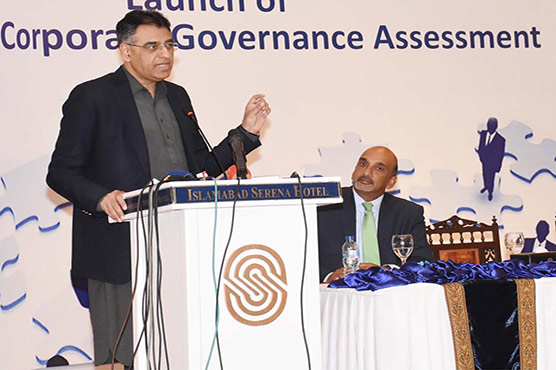Asad Umar applauds WB recognition of enhanced Pak compliance of corporate governance standards

Basic shareholder rights were protected and were improved by the enactment of Companies Act, 2017.
(APP) – Finance Minister Asad Umar on Monday applauded the World Bank’s recognition of Pakistan’s enhanced implementation of corporate governance principles in its Pakistan Report on Observance of Standards and Codes (ROSC) on Corporate Governance.
The outcomes of the World bank assessment would contribute to the government reform agenda to improve the investment climate, the attractiveness of the capital market, and public sector company (PSC) reforms, the minister said according to an SECP press release.
The Report on the Observance of Standards and Codes (ROSC) is a prominent component of global efforts to strengthen the international financial architecture and aims at promoting greater financial stability, both domestically and internationally, through the development, dissemination, adoption and implementation of international standards and codes.
The ROSC corporate governance initiative is administered by the World Bank that assesses the degree to which a country observes the G20/ organization of Economic Cooperation and Development (OECD) Principles of Corporate Governance (OECD Principles) the international reference point for good corporate governance and develops a series of recommendations to reduce or close identified gaps.
The report assessed that OECD 20 principles fully implemented, 33 broadly implemented, 16 principles partially implemented and three not applicable. A comparison with the 2005 Corporate Governance ROSC shows the level of improvement in the corporate governance framework; in 2005 out of a total of 32 applicable principles, only 4 were fully implemented, 17 were broadly implemented, 10 were partially implemented and 1 was reported as not implemented.
The assessment noted considerable improvement in compliance from 66 percent in 2005 to 77 percent in 2018 and has assessed Pakistan as “broadly implemented” against the OECD Principles of Corporate Governance.
The report also assessed compliance in five areas including; the commitment of the public and private sectors to reform; Shareholder rights; Disclosure and transparency; Boards of directors and Public sector companies.
It noted that the government took many important steps to improve the regulation of corporate governance reform in Pakistan, including the updates to the Companies Act, the issuance of the Listed Companies (Code of Corporate Governance) Regulations (“LCR”) and updates to the Public Sector Companies (Corporate Governance) Rules 2013.
The report said, “The private sector has been a strong supporter of improved governance and has supported many initiatives. Many key institutions are in place, including the Pakistan Institute of Corporate Governance. LCR issued by the SECP in 2017 set detailed corporate governance requirements. Listed companies are required to include statements of compliance with the LCR in their annual reports.
The LCR has had great impact on the adoption of good corporate governance by companies and shall facilitate implementation of structured legislative reforms.”
Basic shareholder rights, it noted, were protected in Pakistan and were improved by the enactment of the Companies Act 2017.
Similarly, fiduciary duties of board of directors were codified in the new Companies Act and were one of its most important reforms.
“However, the fact that many boards are dominated by the controlling family / parent / Ministry makes it a challenge for board members to be truly accountable to all shareholders. Most elements of international good practice w.r.t responsibilities of the board are addressed through LCR,” it added.
The ROSC also examined the governance challenges in a key set of public interest entities – Pakistan’s Public Sector Companies (PSCs). The 169 PSCs in the government’s portfolio represent a sizable part of Pakistan’s economy. The Public Sector Companies (Corporate Governance) Rules 2013 are a recent addition to the legal and regulatory framework and represent an important effort by the Government to improve the governance of the PSCs.
The Rules and their enforcement by SECP have begun to put positive gravity on the PSCs which appear to be moving towards better overall governance practices.

